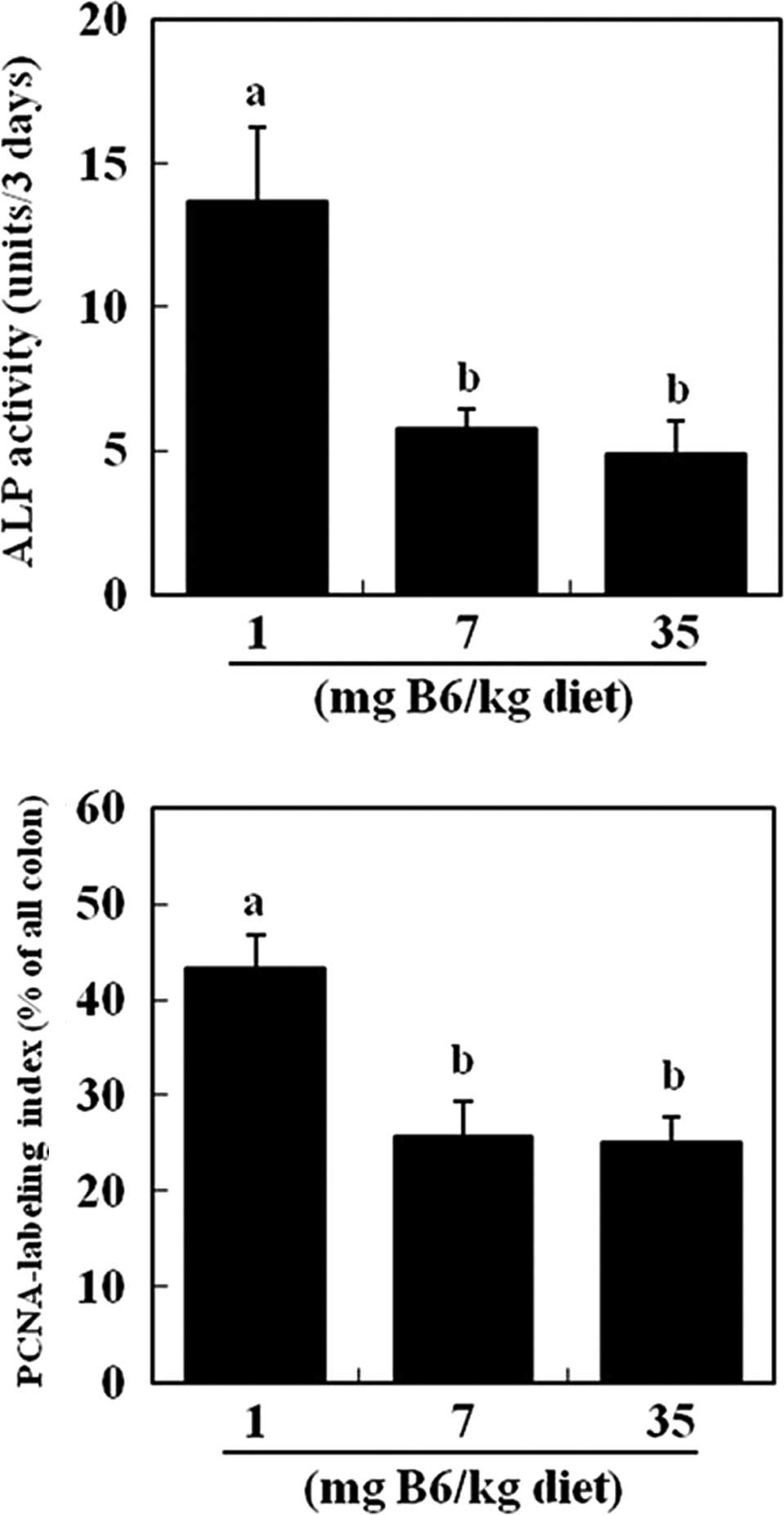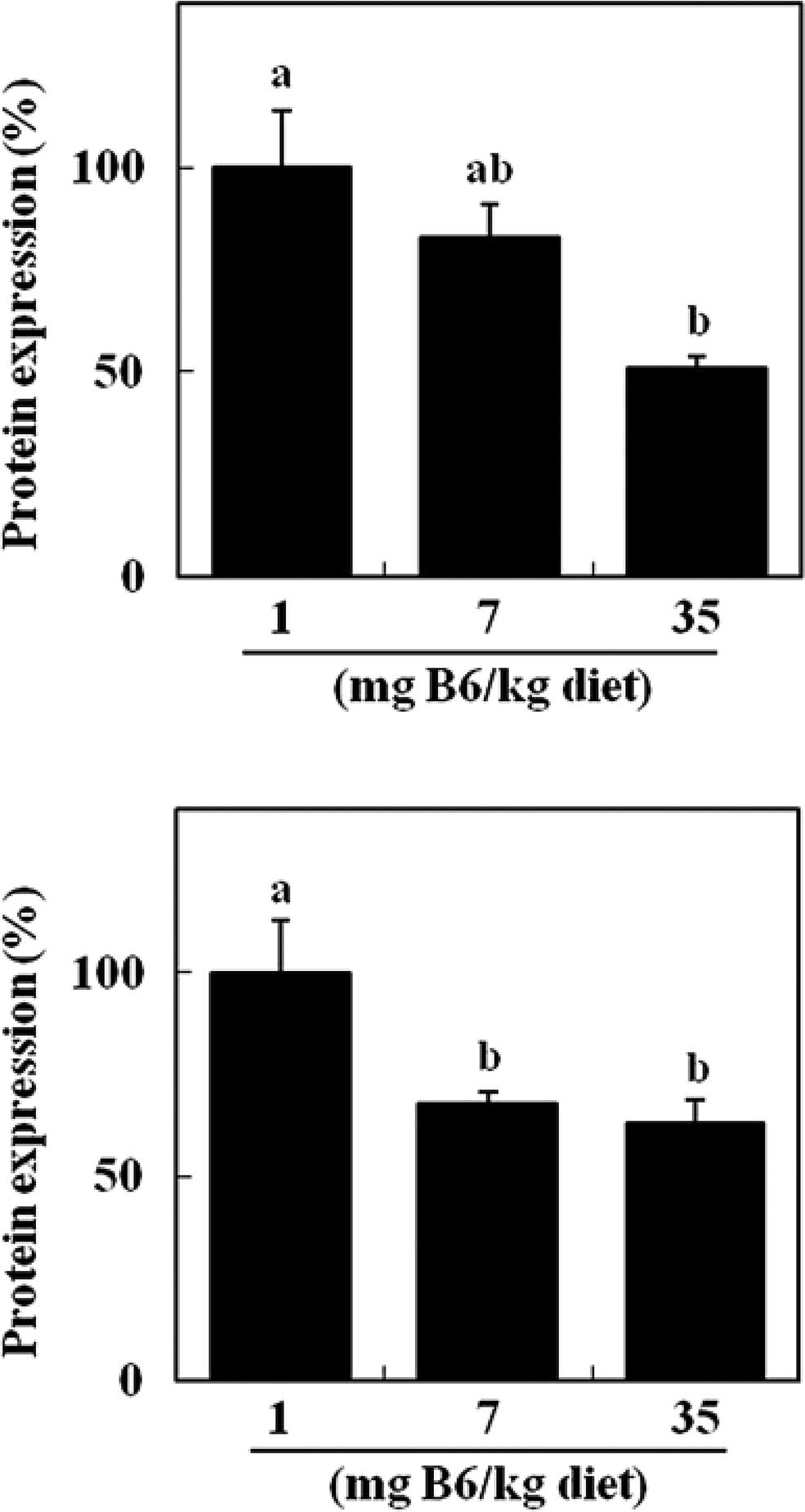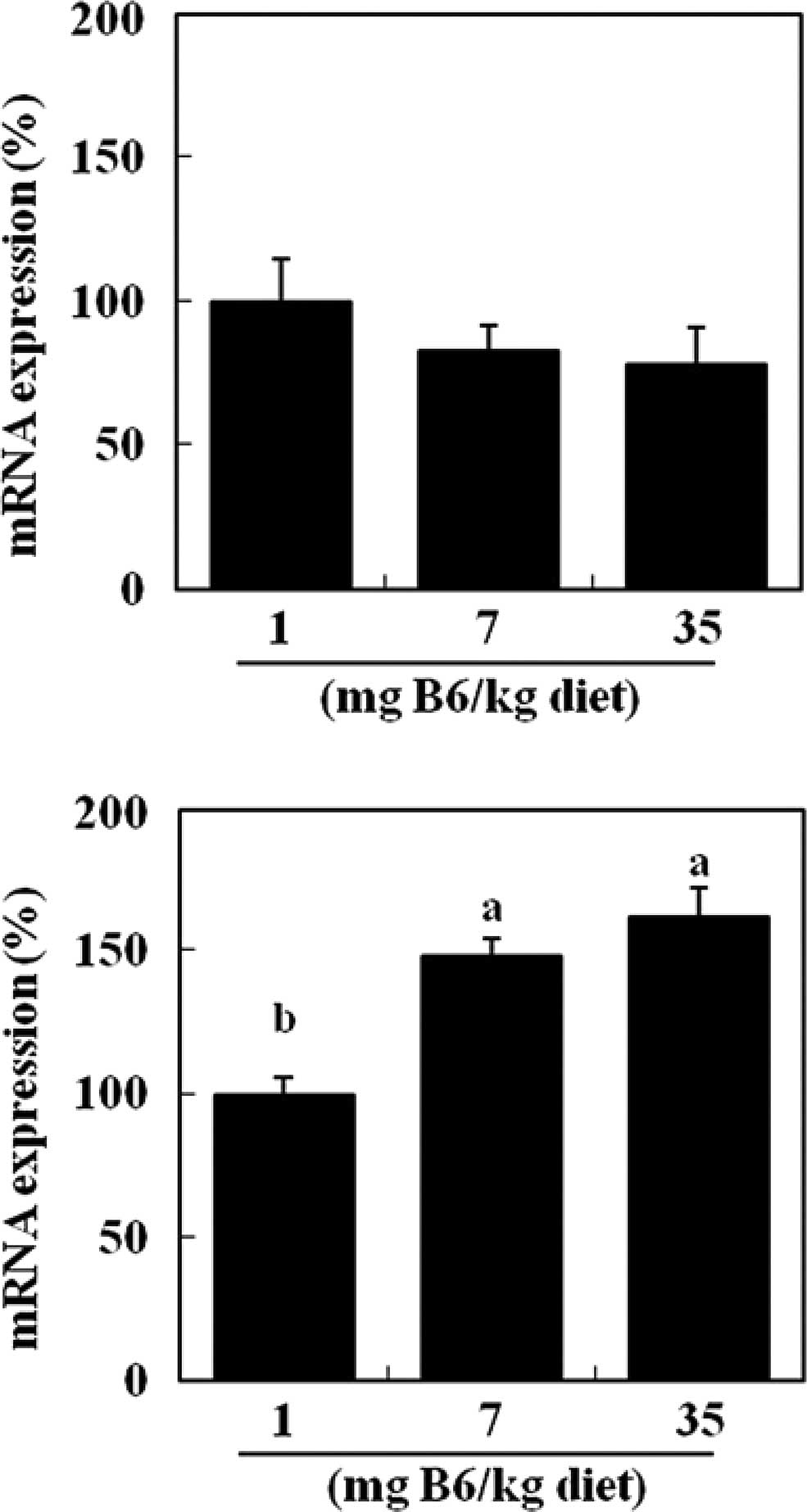|
1
|
Komatsu SI, Watanabe H, Oka T, Tsuge H,
Nii H and Kato N: Vitamin B-6-supplemented diets compared with a
low vitamin B-6 diet suppress azoxymethane-induced colon
tumorigenesis in mice by reducing cell proliferation. J Nutr.
131:2204–2207. 2001.PubMed/NCBI
|
|
2
|
Komatsu S, Isobe M, Yanaka N and Kato N: A
high-fat diet enhances the inhibitory effect of dietary vitamin B6
on colon cell proliferation in mice. Oncol Rep. 14:265–269.
2005.PubMed/NCBI
|
|
3
|
Ishihara J, Otani T, Inoue M, Iwasaki M,
Sasazuki S and Tsugane S: Low intake of vitamin B-6 is associated
with increased risk of colorectal cancer in Japanese men. J Nutr.
137:1808–1814. 2007.PubMed/NCBI
|
|
4
|
Theodoratou E, Farrington SM, Tenesa A, et
al: Dietary vitamin B6 intake and the risk of colorectal cancer.
Cancer Epidemiol Biomarkers Prev. 17:171–182. 2008. View Article : Google Scholar : PubMed/NCBI
|
|
5
|
Larsson SC, Orsini N and Wolk A: Vitamin
B6 and risk of colorectal cancer: a meta-analysis of prospective
studies. JAMA. 303:1077–1082. 2010. View Article : Google Scholar : PubMed/NCBI
|
|
6
|
Matsubara K, Mori M, Matsuura Y and Kato
N: Pyridoxal 5′-phosphate and pyridoxal inhibit angiogenesis in
serum-free rat aortic ring assay. Int J Mol Med. 8:505–508.
2001.
|
|
7
|
Komatsu S, Watanabe H, Oka T, Tsuge H and
Kato N: Dietary vitamin B6 suppresses colon tumorigenesis,
8-hydroxyguanosine, 4-hydroxynonenal, and inducible nitric oxide
synthase protein in azoxymethane-treated mice. J Nutr Sci
Vitaminol. 48:65–68. 2002. View Article : Google Scholar : PubMed/NCBI
|
|
8
|
Komatsu S, Yanaka N, Matsubara K and Kato
N: Antitumor effect of vitamin B6 and its mechanisms. Biochim
Biophys Acta. 1647:127–130. 2003. View Article : Google Scholar : PubMed/NCBI
|
|
9
|
Yanaka N, Koyama TA, Komatsu S, Nakamura
E, Kanda M and Kato N: Vitamin B6 suppresses NF-κB activation in
LPS-stimulated mouse macrophages. Int J Mol Med. 16:1071–1075.
2005.
|
|
10
|
Kanellis P, Gagliardi M, Banath JP, et al:
A screen for suppressors of gross chromosomal rearrangements
identifies a conserved role for PLP in preventing DNA lesions. PLoS
Genet. 3:1438–1453. 2007. View Article : Google Scholar : PubMed/NCBI
|
|
11
|
Lapre JA and van der Meer R: Diet-induced
increase of colonic bile acids stimulates lytic activity of fecal
water and proliferation of colonic cells. Carcinogenesis. 13:41–44.
1992. View Article : Google Scholar : PubMed/NCBI
|
|
12
|
Lapre JA, De Vries HT and van der Meer R:
Cytotoxicity of fecal water is dependent on the type of dietary fat
and is reduced by supplemental calcium phosphate in rats. J Nutr.
123:578–585. 1993.PubMed/NCBI
|
|
13
|
Wallace JL, Whittle BJ and Boughton-Smith
NK: Prostaglandin protection of rat colonic mucosa from damage
induced by ethanol. Dig Dis Sci. 30:866–876. 1985. View Article : Google Scholar : PubMed/NCBI
|
|
14
|
Geng M-Y, Saito H and Katsuki H: Effects
of vitamin B6 and its related compounds on survival of cultured
brain neurons. Neurosci Res. 24:61–65. 1995. View Article : Google Scholar : PubMed/NCBI
|
|
15
|
Geng M-Y, Saito H and Nishiyama N:
Protective effects of pyridoxal phosphate against glucose
deprivation-induced damage in cultured hippocampal neurons. J
Neurochem. 68:2500–2506. 1997. View Article : Google Scholar
|
|
16
|
Calderwood SK, Khaleque MA, Sawyer DB and
Ciocca DR: Heat shock proteins in cancer: chaperones of
tumorigenesis. Trends in Biochem Sci. 31:164–172. 2006. View Article : Google Scholar : PubMed/NCBI
|
|
17
|
Was H, Dulak J and Jozkowicz A: Heme
oxygenase-1 in tumor biology and therapy. Current Drug Targets.
11:1551–1570. 2010. View Article : Google Scholar : PubMed/NCBI
|
|
18
|
Zhu X, Fan WG, Li DP, Lin MCM and Kung H:
Heme oxygenase-1 system and gastrointestinal tumors. World J
Gastroenterol. 16:2633–2637. 2010. View Article : Google Scholar : PubMed/NCBI
|
|
19
|
Reeves PG, Nielsen FH and Fahey GC Jr:
AIN-93 purified diets for laboratory rodents: final report of the
American Institute of Nutrition ad hoc writing committee on the
reformulation of the AIN-76A rodent diet. J Nutr. 123:1939–1951.
1993.
|
|
20
|
Davis CD: Low dietary copper increases
fecal free radical production, fecal water alkaline phosphatase
activity and cytotoxicity in healthy men. J Nutr. 133:522–527.
2003.
|
|
21
|
Teixeira CR, Tanaka S, Haruma K, Yoshihara
M, Sumii K and Kajiyama G: Proliferating cell nuclear antigen
expression at the invasive tumor margin predicts malignant
potential of colorectal carcinomas. Cancer. 73:575–579. 1994.
View Article : Google Scholar : PubMed/NCBI
|
|
22
|
Bradford MM: A rapid and sensitive method
for the quantitation of microgram quantities of protein utilizing
the principle of protein-dye binding. Anal Biochem. 72:248–254.
1976. View Article : Google Scholar : PubMed/NCBI
|
|
23
|
Schmitt E, Maingret L, Puig PE, et al:
Heat shock protein 70 neutralization exerts potent antitumor
effects in animal models of colon cancer and melanoma. Cancer Res.
66:4191–4197. 2006. View Article : Google Scholar : PubMed/NCBI
|
|
24
|
Hirai K, Sasahira T, Ohmori H, Fujii K and
Kuniyasu H: Inhibition of heme oxygenase-1 by zinc protoporphyrin
IX reduces tumor growth of LL/2 lung cancer in C57BL mice. Int J
Cancer. 120:500–505. 2007. View Article : Google Scholar : PubMed/NCBI
|
|
25
|
Asea A, Kraeft SK, Kurt-Jones EA, et al:
HSP70 stimulates cytokine production through a CD14-dependant
pathway, demonstrating its dual role as a chaperone and cytokine.
Nat Med. 6:435–442. 2000. View
Article : Google Scholar : PubMed/NCBI
|
|
26
|
Qian S, McDonough H, Boellmann F, Cyr DM
and Patterson C: CHIP-mediated stress recovery by sequential
ubiquitination of substrates and Hsp70. Nature. 440:551–555. 2006.
View Article : Google Scholar : PubMed/NCBI
|

















